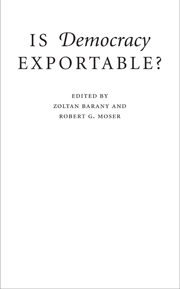Introduction
Published online by Cambridge University Press: 05 June 2012
Summary
The question that provides the title of this volume has now returned to the center of public discussion, largely because of the severe difficulties in building democratic regimes following the successful military invasions of Afghanistan and Iraq. In the 1990s a fairly wide consensus had developed both in the United States and internationally, in favor of active efforts to assist those seeking to establish and maintain democratic institutions. Today, however, that consensus is fraying, and people once again are asking: Is democracy exportable? Can or should the United States or other democratic countries try to export it?
How one answers this question depends in substantial part on how the meaning of the word “export” is understood. It is clear that democracy cannot be exported in the way that food, or clothing, or machinery can be. In fact, organizations that are devoted to promoting the growth of democracy abroad do not like to characterize their own activity as being aimed at the “export” of democracy. The five-year strategy document adopted by the National Endowment for Democracy (NED) in 2007 even proclaims, “Democracy cannot be exported or imposed.”
In disclaiming the idea that they are in the export business, democracy-promotion organizations acknowledge that there is a kernel of truth in the argument that democracy can take root only if it is homegrown. By its very nature, democracy is a political system that is founded on the consent of the governed.
- Type
- Chapter
- Information
- Is Democracy Exportable? , pp. 1 - 12Publisher: Cambridge University PressPrint publication year: 2009
- 5
- Cited by

